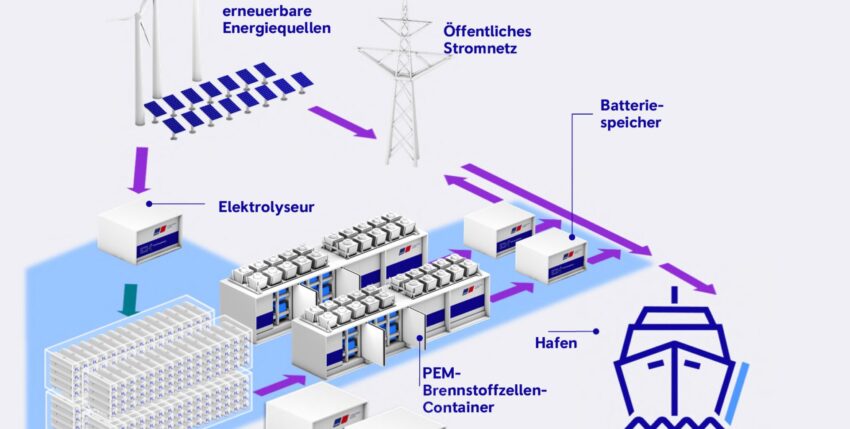From a Rolls-Royce press release:
The container terminal currently under construction at the port of Duisburg will in future be supplied with climate-neutral energy by Rolls-Royce. Rolls-Royce's Power Systems division is supplying its latest mtu hydrogen technology to power the terminal.
future terminal sustainably with electrical energy and heat: fuel cell solutions for electrical peak load coverage, plus hydrogen cogeneration plants. Duisport, one of the largest inland ports in the world, is working with several partners to build a hydrogen-based supply network by 2023, which includes several technologically sophisticated options for energy conversion and storage.
From the coal island to the fuel cell
As one of the fuels of the future and a key component of the energy transition, hydrogen will play a central role when Duisburg, Europe's largest inland port, demonstrates in a few years' time what the energy supply of the future could look like: decentralised and climate-friendly. The largest container terminal in the European hinterland is currently being built on the former coal island, once a transshipment centre for bulk goods. It will not only set new standards in freight handling, but also in climate-friendly energy supply. Fuel cells and mtu hydrogen engines play the main role in this project called "enerport II" - each with different tasks.
The "enerport" energy concept
The hydrogen-powered mtu fuel cell solutions will supply electricity as soon as the public power grid reaches its limits, for example to supply on-board power to ships moored in the harbour or in the event of other peak loads. In addition, two combined heat and power plants with mtu Series 4000 hydrogen engines convert hydrogen energy into electrical energy, which is fed into the supply network of the future container terminal or into the public grid. The waste heat is used for process heat or to heat buildings in and around the port. Furthermore, photovoltaic systems and battery storage are integrated into the local supply network, which is being realised by the port operator Duisport, Westenergie Netzservice, Netze Duisburg, Stadtwerke Duisburg and Stadtwerke Duisburg Energiehandel together with the Fraunhofer Institute Umsicht. The "enerport II" project is being funded by the Federal Ministry of Economics and Climate Protection for a period of four years as part of the "Hydrogen Technology Campaign".
Energy from hydrogen
"Hydrogen technology is no longer a dream of the future, but will prove itself in everyday use in Duisburg. The parallel use of fuel cell solutions and hydrogen engines shows that we are on the right track with our open-technology approach to developing new solutions for the energy supply of the future," says Andreas Schell, CEO of Rolls-Royce Power Systems.










